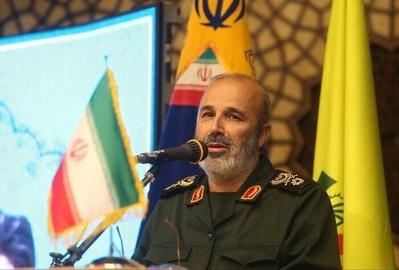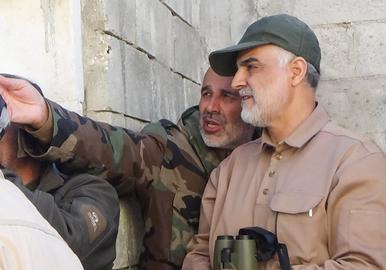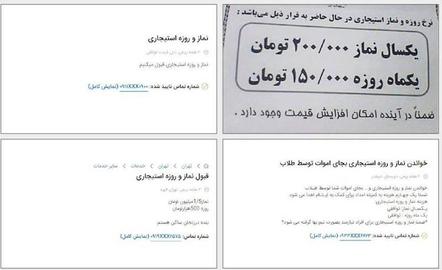The Supreme Leader has promoted Mohammad Reza Fallahzadeh to deputy commander of the Quds Force following the death of Mohammad Hosseinzadeh Hejazi, which was announced on April 18. Fallahzadeh is now deputy to Commander Ismail Qaani.
Fallahzadeh, who was third in command, has mainly led a military life, though he did serve as governor of Yazd for six years. Notably, he also once introduced himself as “an adviser to the foreign minister,” a claim that was never actually confirmed.
It will come as no surprise to anyone who follows Iran that the United States intelligence agencies have recently concluded that the Quds Force, which leads the Islamic Revolutionary Guard Corps' external operations, will remain front and center of Iran’s military project in the Middle East, and a key representative of its power and might. As part of this international presence, Fallahzadeh will be the subject of much scrutiny and analysis.
As Iran observers and analysis consider Mohammad Hejazi’s unexpected and untimely death at 65 — and the mounting rumors about how he died — there has also been ample discussion about the new Quds Force's second-in-command.
Mohammad Reza Fallahzadeh, also known as Abu Bagher, had previously worked closely with Commander Ghasem Soleimani on Syrian operations before Soleimani’s death in January 2020, and has, apart from his stint as governor, always served in the Revolutionary Guards, holding a wide range of positions over a 41-year career.
Mohammad Reza Fallahzadeh was born in 1962 in Abarkooh in Yazd province, and served as a middle-rank commander during the Iran-Iraq war. After the war, he was a commander for the 19th Fajr Division of the Revolutionary Guards’ ground forces in Fars province, for the 40th Saheb al-Zaman Division in Isfahan province, the 18th Al-Ghadir Division in Yazd province, the Karbala Sazandegi Headquarters, and other provincial divisions of the Revolutionary Guards.
In July 2007, the government of Mahmoud Ahmadinejad announced the appointment of Fallahzadeh, who was by that time a senior member of the Guards, as the new governor of Yazd.
He remained in this position for six years until the end of Ahmadinejad's term in 2013.
However, with the inauguration of Hassan Rouhani, he once again donned a military uniform and went to Syria, where he was regarded as second-in-command in the country under Soleimani. Some media outlets referred to him as the chief commander of the Battle of Aleppo in 2016.
Although he was still a military man, his time in politics seemed to have become something of a habit. During the Astana Talks in Kazakhstan to broker a peaceful end to the war in Syria in May 2017, Fallahzadeh appeared in civilian clothes alongside Hossein Jaberi Ansari, the head of the Iranian delegation, and introduced himself as an adviser to the foreign minister — a position that does not appear in any Ministry of Foreign Affairs archives.
He was wounded during his time in Syria and was immediately transferred to Tehran, where he was visited by a number of key Islamic Republic officials, including Mohammad Taqi Mesbah Yazdi.
Fallahzadeh held the rank of second brigadier general until 2018, but in March of that year, at the suggestion of Ghasem Soleimani, he was awarded the rank of brigadier general. With this rank, he was appointed as deputy coordinator of the Quds Force, the third-in-command of the force. At that time, of course, Ghasem Soleimani led the Quds Force.
Mohammad Hejazi: A Death that Hit the Headlines
Mohammad Hejazi was a well-known military figure. He featured on the international sanctions list, and the Israeli military has repeatedly cited Hejazi as one of the three main people responsible for supplying weapons to Hezbollah in Lebanon and setting up missile launchers.
The news would have been newsworthy given his position no matter what, but the official cause of death also sparked uproar and speculation. As ever, social media helped fuel the debate. Many commented that the circumstances around Hejazi’s death were suspicious and that the public were being shielded from the full details of what happened. Some even suggested there was subterfuge at play.
There was also debate about the future of the Revolutionary Guards, and even people with pro-regime leanings commented that the Guards could do well to inject some “youthfulness” into its ranks, which some accused of being “old” and even “ignorant”.
The official Revolutionary Guards Public Relations announcement on Sunday, April 18 reported Hejazi’s death was linked to a heart condition. Shortly afterwards, Mohammad Mehdi Hemmat, the son of Mohammad Ebrahim Hemmat, one of the most famous commanders killed in the Iran-Iraq war, contradicted the official account on Twitter. Without providing further explanation, he added the hashtag "martyr" to his post. The tweet was later deleted.
A day later, Ramazan Sharif, a spokesperson for the Guards, denied that Hejazi had died of a heart attack, saying he had died due to "chemical effects" he had been exposed to during the war.
According to Sharif, the "special commission" in Baqiyatolah Hospital, which is affiliated with the Revolutionary Guards, also cited chemical complications as the main cause of death. He too declared Hejazi a "martyr veteran”. The word “martyr” was also used by Revolutionary Guards Commander Hossein Salami in reference to Hejazi’s demise. He and Ramazan Sharif also both claimed Hejazi was on Israel's list of terrorists.
Despite this, Ali Khamenei, the Supreme Leader of the Islamic Republic, made no reference to Hejazi as a martyr when he published his official message of condolence. It was widely believed that this would put an end to the matter, but Ismail Qaani’s insistence on calling Hejazi a martyr on the evening of Tuesday, April 20 ensured the debate continued.
Meanwhile, a cleric announced on the Islamic Republic’s state TV: "Hejazi's illness lasted a total of about 24 hours. He had no history of illness. His heart stopped at once; it was a virus, but not the coronavirus."
The day before, a Guards spokesperson had said that Hejazi had contracted coronavirus a few months before, but had recovered.
Mohammad Hejazi had been appointed Deputy Commander of the Quds Force following the assassination of Ghasem Soleimani in early 2020.
Prior to that, Hejazi was the Commander of the voluntary unit of the Revolutionary Guards, the Basij (1997-2007), the Deputy Coordinator of the Revolutionary Guards (2007-2008), the Deputy Commander-in-Chief of the Guards (2008-2009), and the Deputy Chief of Staff of the Armed Forces (2009-2014).
Following this death, a number of reports and analyses have pointed to Hejazi’s strong presence in Lebanon and Syria, and some analysts, along with former government official Amir Moghadam, talked of his role in the war in Yemen and his numerous trips to Venezuela.
Related coverage:
Who is Ismail Qaani, the New Commander of the Revolutionary Guards’ Quds Force?
Who was General Ghasem Soleimani: Murderer or Hero?
A Year After his Death, Soleimani's Corrupt Practices Begin to Surface
visit the accountability section
In this section of Iran Wire, you can contact the officials and launch your campaign for various problems



























comments